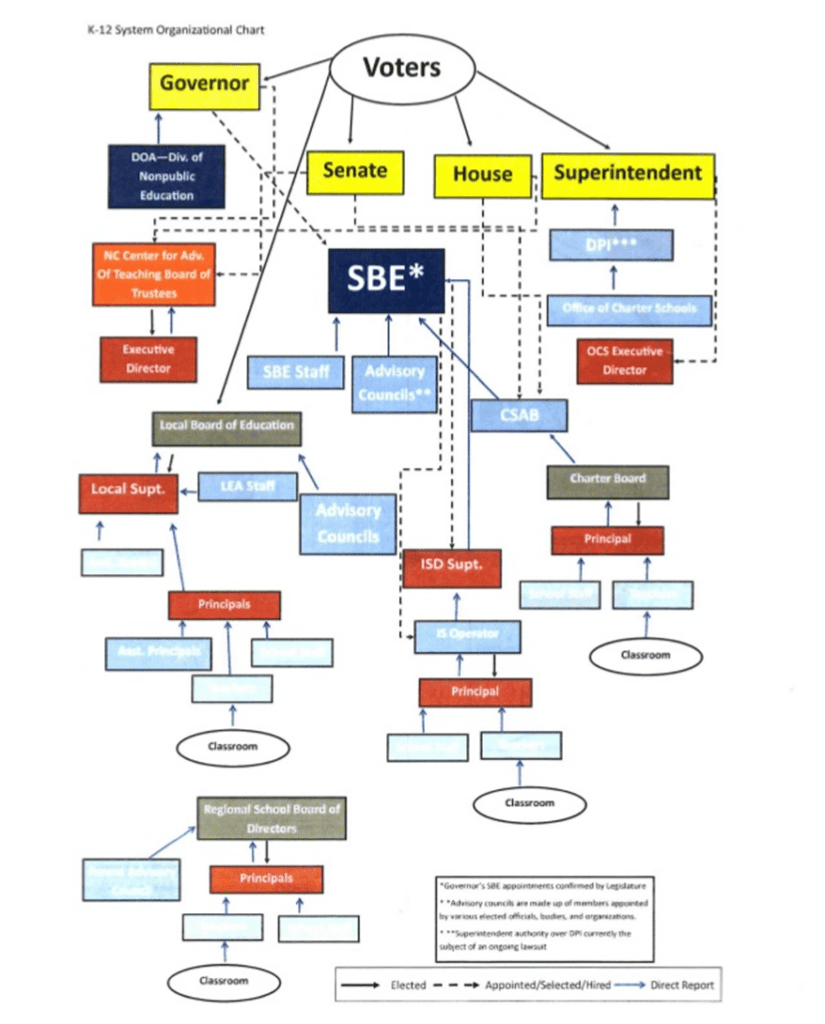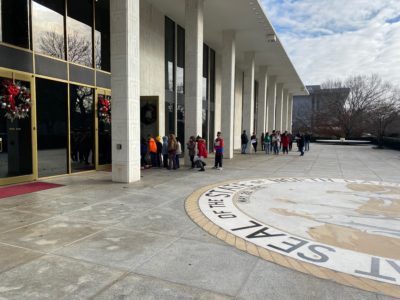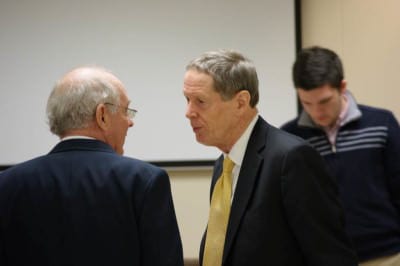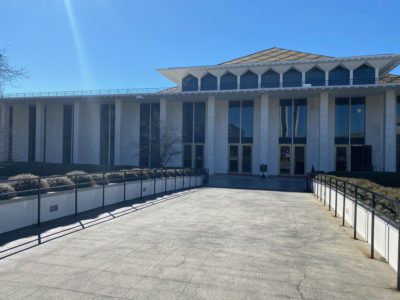

|
|
State government 101
Much of my career has been spent trying to make sure people across the state are comfortable and confident participating in state government, from walking into the legislature to interacting with policymakers.
Here is what I think you need to know to be an effective citizen advocate. If you are still nervous about going to the legislature after reading this article, reach out to us. Alex, Liz, Rupen, and Hannah on our team cover the legislature, and they would be happy to show you around.
Let’s start with how to talk like a Tar Heel. Bookmark this audio guide of cities, towns, and other places around North Carolina. You’ve got to sound like you know the places you are talking about.
Here is a link to the North Carolina Constitution.
Article II: Legislative power
Article II of our state constitution vests legislative power in the N.C. General Assembly.
From 1898-2010, Democrats largely controlled the legislature. Republicans have held power since then.
Each session of the General Assembly in North Carolina convenes for two years — often referred to as a biennium. Our “long” session started at noon on Jan. 11, 2023.
In the long session, bills are introduced, and a two-year budget is adopted. This resource by the Office of State Budget and Management explains how the state budget is created. Each biennium, the state House and Senate alternate which chamber takes the lead on budget legislation. This session the House will take the lead.
Typically the long session lasts until July just after the state’s fiscal year ends in June, though sometimes it lasts much longer. The “short” session will convene in spring 2024. Bills that have passed one house (you may hear people talk about this as “crossover”), recommendations from a study commission, or issues related to the budget are in play during the short session.
There are 120 members in the House of Representatives and 50 members in the Senate. All of the legislators in both houses serve two-year terms. There are no term limits in North Carolina. The legislators who are elected to the General Assembly serve part-time and often have other jobs back home. During session, they typically meet on Monday evenings, Tuesdays, Wednesdays, and Thursdays.
Both chambers — the House and the Senate — are in the Legislative Building. It is located at 16 West Jones St. in Raleigh. Rooms in this building have four digits, like 1226.
The Legislative Office Building, which has many of the offices for the legislators as well as larger committee rooms, is located across the street from the Legislative Building at 300 North Salisbury St. There is a bridge over Lane Street that allows people to go from one building to the other easily. Rooms in the Legislative Office Building have three digits, like 544.
Here is a virtual tour of our legislature.
The House of Representatives
The speaker of the House is Tim Moore of Kings Mountain. He has served as speaker since 2015, and this is his 11th term.
In the House of Representatives, there are 71 Republicans and 49 Democrats. There are 25 new members in the House, 33 women, 26 African Americans, 2 Asian, and 1 Native American. Here is contact information, and here is where you can export contact information in Excel. Here is demographic information about the House, here are the birthdays of representatives, here is representation by county, here are terms served (helpful with understanding seniority), here is military experience, and here are occupations and education.
The House principal clerk provides lots of information about the representatives.
Here is more information about leadership, seats, offices, committees, and bill deadlines (see rule 31.1).
The Senate
Mark Robinson is the lieutenant governor and president of the Senate. Though not a legislator, the lieutenant governor serves as the presiding officer of the Senate and has the power to vote when the members of the Senate are equally divided. The president pro tempore of the Senate is Phil Berger from Eden. He has served as president pro tempore since 2010, and this is his 12th term.
In the Senate, there are 30 Republicans and 20 Democrats. There are 12 new members in the Senate, 17 women, 9 African Americans, 2 Indian Americans, and 1 Asian. Here is contact information, and here is where you can export contact information in Excel. Here is the demographic information about the Senate, here are the birthdays of senators, here is representation by county, here are terms served (helpful with understanding seniority), here are occupations, education, and military experience.
The Senate principal clerk provides lots of information about the senators.
Here is more information about leadership, seats, offices, legislative assistants, committees, and bill deadlines (see rule 40.2).
More information about the legislature
The General Assembly’s website is quite good so take some time ahead of the session to find your way around.
The House and Senate calendars are helpful for citizen advocates because they give you notice of when bills will be taken up in committee and on the floor. That doesn’t mean that there aren’t surprises!
Here is information about the fiscal research division, the legislative drafting division, and the legislative analysis division.
If you decide to make the trip to Raleigh, here is the information you need on directions to the legislature, parking, info on attending sessions, and dining. Here are the building rules.
If you can’t come to Raleigh, you can listen in remotely. Here is a link to audio broadcasts so you can listen in on the House and Senate chambers as well as important committee rooms and the room used for press conferences. Many committee rooms also have video livestreams now as well. You can also follow activity in the chambers using the House dashboard and the Senate dashboard.
This very complicated chart shows you how a bill becomes law in North Carolina. Note that often the ideas for bills starts with you, the concerned citizen.
Here is information about how to register as a lobbyist with the secretary of state.
Bill tracking
Here are some ways to track what is happening with the education bills you care about most.
EdNC’s Alex Granados is updating our bill tracker weekly. As the session unfolds, you will be able to see which bills meet the crossover deadline and which ones get passed.
On the legislature’s website, you will find in the upper right hand corner a bill search. Type in the number of the bill there. This will take you to the landing page for the bill. There you can find a bill digest prepared by the UNC School of Government’s Legislative Reporting Service. You can also find up-to-date versions of the bill summary. This is where you will find the most current version of the bill, bill sponsors, votes on the bill, and can track the bill history.
One way to monitor legislation is through the UNC School of Government’s Legislative Reporting Service. There is no charge, and you don’t need to sign in to view the daily bulletin, bills, and bill summaries. But if you create a free account, you can monitor select bills and create reports tailored to your interests. Here is the website.
The N.C. State Board of Education provides bill tracking. The N.C. Association of School Administrators also provides bill tracking.
Article III: Executive power
Article III of our state constitution vests executive power in the governor. Here is the website for Gov. Roy Cooper, a Democrat.
The governor has the power to propose a budget. Here is the website of the Office of State Budget and Management. Kristin Walker is the state budget director.
The governor of North Carolina was the last governor in the country to receive veto power in 1996. Here is where you can see how many bills have been vetoed each session.
The governor has the power to issue executive orders. Here is where you can keep track of all of the executive orders.
And don’t underestimate the power of the governor to leverage the bully pulpit.
The Council of State includes the lieutenant governor, the secretary of state, the auditor, the treasurer, the superintendent of public instruction, the attorney general, and the commissioners of agriculture, labor, and insurance. There are six Republicans and three Democrats in addition to the governor on the Council of State, and all members of the Council are elected.
The Cabinet includes appointed positions, including the secretaries of administration, commerce, environmental quality, health and human resources, information technology, military and veterans affairs, natural and cultural resources, public safety, revenue, and transportation. The governor’s chief of staff, director of the office of state human resources, and the state budget director meet with the cabinet.
The governor also has staff, and Geoff Coltrane serves as his senior education advisor.
By statute, there is also an education cabinet. The governor serves as chair, and the education cabinet includes the superintendent of public instruction, the chair of the State Board of Education, the president of the UNC System, the president of the N.C. Community College System, and the president of the N.C. Independent Colleges and Universities.
North Carolina has three independent executive agencies: the Office of Administrative Hearings, the Office of the State Controller, and the State Board of Elections.
The N.C. State Education Assistance Authority (NCSEAA) “is a political subdivision of the state, governed by a nine-member Board of Directors, with administrative support provided by the University of North Carolina.”
Article IV: Judicial power
Here is the website for the N.C. Supreme Court. Here is the website for the N.C. Court of Appeals.
Here is EdNC’s coverage of Leandro, the lawsuit that established a state constitutional right to a sound, basic education.
Article IX: Education
Section 4 of Article IX of our state constitution establishes the roles of the State Board of Education and the superintendent of public instruction. Here is the website of the State Board of Education, here are the members, here are the meeting dates for 2023. Eric Davis is the chair of the State Board of Education. Dr. Maria Pitre-Martin is the director of operations and policy. Here is the board’s strategic plan.
The superintendent of public instruction is Catherine Truitt. Here is the website for the Department of Public Instruction.
Here is where you can find information about charter schools.
There is a division of non-public education in the state department of administration. Here you can find information about home schools, and here you can find information about private schools.
The federal government
Miguel Cardona is the secretary of the U.S. Department of Education.
Local governments
North Carolina has 100 counties, and the counties provide local funding for education.
There are 115 school districts, often referred to as LEAs, which stands for local education agency.
Each district has an elected (partisan and nonpartisan) or appointed school board and a superintendent.
Our complex ecosystem
This structure creates a complex ecosystem of policy and politics. We have the governor; the governor’s education cabinet; the N.C. General Assembly; UNC’s president and Board of Governors; 17 campuses each with a chancellor and board of trustees; the president and State Board of Community Colleges and 58 community colleges across the state with their own president and board of trustees; the superintendent of public instruction; the Department of Public Instruction; the chair and the State Board of Education; 115 school boards for 115 districts, 115 superintendents; 203 charter schools; and 100 county commissions that fund local education.
Note that voters are at the top of this organizational chart. You matter!


Advocacy 101
My colleague Ran Coble taught me that to be an effective citizen advocate, you need to first ask yourself what it is that you want out of the legislature:
- Is it money?
- Is it a change in law?
- Is it that you want to stop something somebody else is proposing?
Do you need the change in the long session or do you have a strategy for the short session if needed? Who are your legislative champions, and who will your champions be when they get tired or distracted?
If you want money, you have to have Republican support because they’re the majority party and in control of the budget.
But you’ll also need to have a relationship with the governor and his team if you need to make sure legislation is or isn’t vetoed.
If it’s a change in law, it’s best for the short-term to have a lead Republican sponsor. But for a variety of reasons, including longer term support for an issue from both sides of the aisle, you might want to seek bipartisan sponsorship and support.
If what you want is to stop something, you may not need a legislative majority because so much of the legislative committee process is by consensus. Consecutive, well-placed objections by a few legislators, or a suggestion from a legislator friendly to you saying “we need to study this some more,” may postpone action on the bill.
And if you want to stop something, but can’t stop it in the legislature, don’t forget that the courts are there to review legislation.
The next question to help you think about being an effective advocate is to ask whether your issue is partisan (one or both parties are staked out on), a nonpartisan issue, or an issue where those for and against it divide not along party lines but some other dividing line.
I have loved watching the search for common ground in the legislature unfold for 30 years. If you have tips for navigating the legislature or state government, please share them with me via Twitter @Mebane_Rash.








